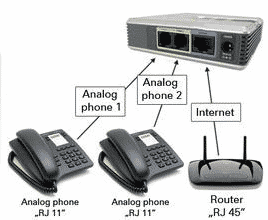There are VoIP providers that support BYOD (Bring Your Own Device) This gives flexibility to the end-user. By supplying their own ATA (Analog Telephone Adapter), there is an added sense of control. This is a good option for tech-savvy users. Using BYOD may result in significant savings and is a good way for providers to save on costs.
There are many good VoIP ATA adapters in Canada. Here we review some of the most popular and affordable options.
One of the most recognized brands in office telecommunications now owns a legend in VoIP Adapters (Obihai is owned by Polycom). Now these Voice adapters are fast becoming a type of cult. At GoneVoIP we like the simplicity because it’s a full ATA with support for one phone line. It supports Fax T.38 it may be configured with any SIP services available and supports the most typical codecs used in VoIP. It has two RJ-45 Ethernet and a USB port which could be used to connect a Wi-Fi adapter. The unit also has embedded QoS capability – which shall help improve and maintain an optimum voice quality throughout all calls. This is one of the darlings of the adapters for VoIP Phone providers.
This is one of the better brands in the market, it comes with free phone service throughout Canada. Supports PureVoice HD for crisp clear calling, voicemail messaging recording, and playback functions. It also supports integrating with smart speakers such as Amazon Alexa.
Cisco has always produced very good network equipment, in the years gone by it used to be Linksys (owned by Cisco) which had tackled the VoIP ATA market better. but here of late seems there is a switch and Cisco’s brand is producing very good and reliable products. The 191 is a very economical and reliable unit, supporting all codecs, and typical features plus having fax (T.38) support. It has one RJ-45 Ethernet interface and also supports two phone lines.
This Grandstream is a great unit, perhaps the most used by VoIP Phone providers (such as VoIP Much) that supply their ATAs. The HT-802 supports a wide variety of codecs, including fax support. It has 2 phone lines and 2 network ports with a network router. A neat feature is that it supports dual SIP servers if the primary SIP server fails it switches to the secondary without user intervention. It supports all the usual VoIP features, such as Do Not Disturb, Caller ID, 3-Way Calling, and so on.
This Linksys is a perennial classic VoIP adapter. Inexpensive yet powerful adapter unit. It has one network interface and two phone lines; supporting all typical codecs and fax with the usual VoIP features. This unit is used extensively in BYOD. Though has since then been faced out by VoIP Phone providers. You may find it in after-market stores, but it is better to pay a few bucks more and have a newer version with support for the latest security features along with newer firmware.
This is the newest version of the GrandStream ATA single port. It still is a great inexpensive yet powerful unit. It comes with one 10/100 network interface and one phone line; supporting all typical codecs and fax with the usual VoIP features. This unit is now the most preferred and go-to by many VoIP Phone providers.
The GS-HT812 is a VoIP adapter that allows Canadians to connect their analog phones to modern VoIP services like VoIP Much or VoIPly, offering a cost-effective alternative to traditional landlines. It features 2 FXS ports for phone connections, great network support for high-quality calls, and strong security with TLS and SRTP encryption. With easy setup and compatibility with major Canadian VoIP providers, it’s a great option for saving on phone bills while keeping your current hardware.
In Conclusion
When choosing an ATA make sure to ask your VoIP service provider for recommendations. Most providers have a hardware compatibility list. They may be able to recommend settings and suggest some adapters over others. The majority of Canada’s Best residential phone providers are listed at GoneVoIP and these providers do support BYOD. Though it is better to ask. In any event, you can use any of these 6 ATA as a primary reference point.

